Skeepers vs. Statusphere: How Do They Compare?
Is Skeepers the right influencer marketing platform for your brand? This post breaks down how Skeepers’ software compares to Statusphere's platform.
For beauty brands who consistently collab with creators, your influencer platform is crucial. But can your current platform handle 100s of partnerships to drive retention?
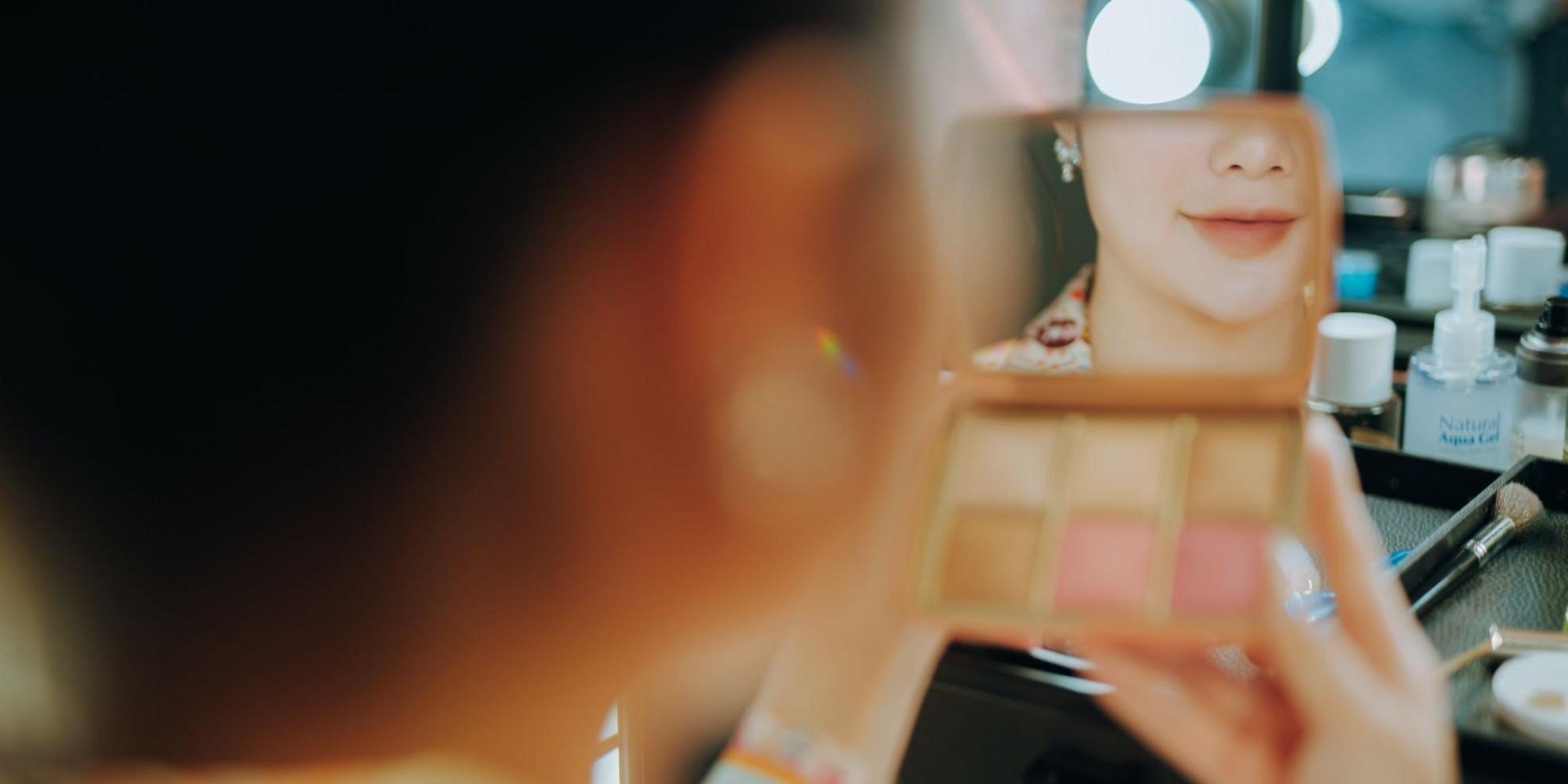
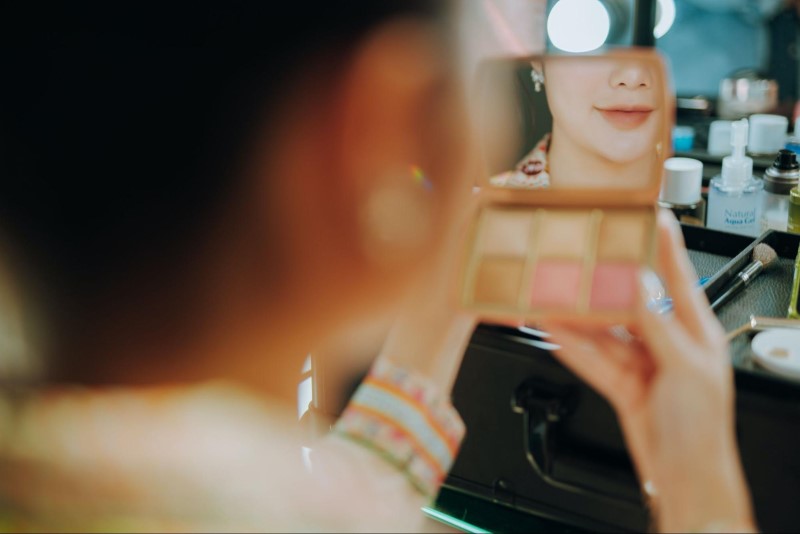
Beauty brands are dealing with a revolving door of influencer platforms right now.
And the marketers we talk to consistently bring up the same three challenges:
Those same brands are under pressure to see results from creators. Usually that pressure comes from stakeholders assuming that beauty influencer marketing is somehow “easy.”
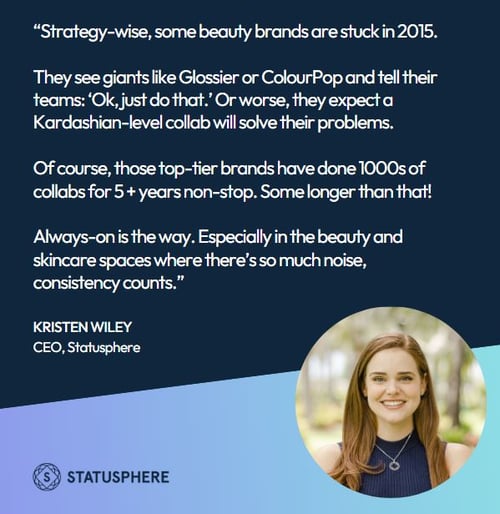
As a result, it's easy to pick a beauty influencer marketing platform out of panic.
But most platforms don’t support an always-on, retention-focused strategy.
Meanwhile, retention and acquisition are the biggest challenges facing the beauty industry today. Is your marketing stack built to meet those challenges head-on?
If you’re not sure, this post can clue you in based on what we’ve been seeing from brands!
The role of influencers in customer retention is well-documented. Food for thought: social media and creators are among the top retention channels for B2C brands this year.
And beauty brands are the blueprint for why always-on influencer marketing works.
Achieving an always-on strategy requires a foundation of posts from micro-influencers.
Building that content engine means automating and eliminating as much as you can. If you handle fulfillment DIY or manually manage every creator, you limit your ability to scale. These tasks can’t demand your time if your goal is to get 100s of creators posting.
We’ve seen firsthand how beauty brands use influencer platforms to tackle their top marketing challenges. Below we share insights to help you do the same.
Good news: beauty brands are spoiled for choice when it comes to influencer talent.
Chances are your DMs are overflowing with collab requests, right?
But the problem isn’t getting quality content from beauty creators. The talent is there.
The struggle? Using influencer content to stay on customers’ shelves long-term.
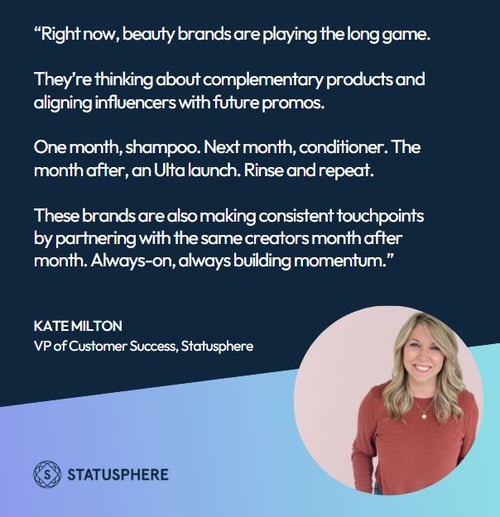
Lifting retention means going beyond one-and-done influencer partnerships. Besides, algorithms are fickle. This remains a big reason why going all-in on macro-influencer endorsements is a gamble.
On the flip side, ongoing content from micro-influencers maintains your momentum. That’s because you’re feeding the algorithms fresh content. Much like you wouldn’t stop doing SEO or sending emails, the same mentality should apply to influencers.
One-off influencer partnerships are time-consuming. Full-stop.
We’ll bite: coordinating with individual creators can be a time-sink even with a platform. Especially if you plan on scaling from a handful to hundreds of beauty creators.
And the reality is that high-volume collabs are becoming the norm in this space.
That’s why beauty influencer marketing platforms should support scalability.
When we built Statusphere, we had the concept of "scale" in mind from the start. We wanted to make an always-on strategy a reality for brands without the time or internal resources.
Below is a step-by-step breakdown of how our platform supports retention for beauty brands.
Sometimes you have those five-star creators who just get it.
They nail their creative briefs and make awesome content without breaking a sweat.
Partnering with those creators for future product launches or UGC ads is a no-brainer.
Repeat collabs are deceptively time-consuming if you’re doing them manually, though. That’s because you’re still on the hook for coordinating posts and shipping products.
If you already trust a creator, going through all of this again is a waste of time for both sides.
To remedy this, we built a process of briefing and fulfillment that’s totally hands-off and automated. With Statusphere, brands can flag creators for re-engagement directly with a single click in our platform. This results in ongoing collaborations in a fraction of the time it takes to set them up DIY.
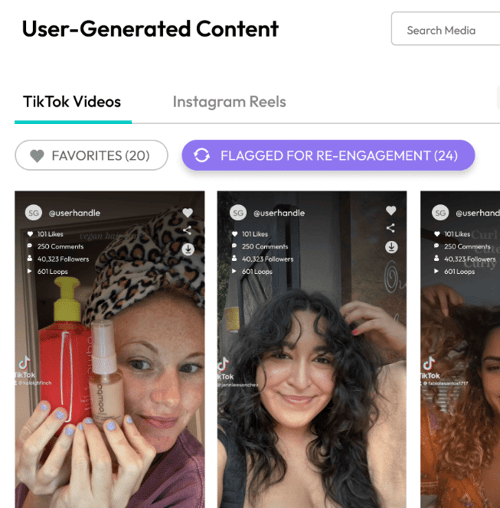
Competition is fierce as brands strive to become staples of customers’ beauty routines.
This highlights the importance of promoting multiple products as part of your influencer promotions over time. Shampoo and conditioner. Cream and serum. You get the picture!
Thankfully, most beauty brands have plenty of complimentary products to offer.
It’s the logistics of how you get those products into makeup influencers’ hands that’s complicated. That’s why fulfillment technology is a make-or-break for a high volume of partnerships.
Beauty influencer campaigns are dynamic, evolving to complement your latest offerings. With Statusphere, brands can seamlessly promote different product lines month-to-month in our platform.
For example, our software enables creators to hand-pick the products and create beauty bundles of items that they’ll actually use.
The result? More authentic content and opportunities for products to shine. Not to mention hours saved wrangling shipping and fulfillment.
Beauty brands and brick-and-mortar partnerships go hand in hand.
And so we believe that the best beauty influencer platforms prioritize retail support.
We’re seeing more and more retail activations as brands focus more on retention.
When influencers create in-store retail content, they’re planting the seeds of loyalty. They’re making it easier for potential customers to understand where they can pick up your products during their next Ulta or Sephora run.
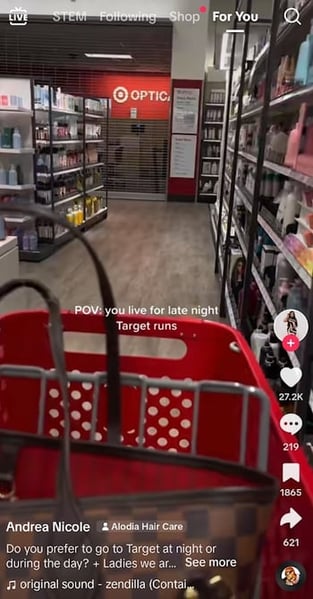
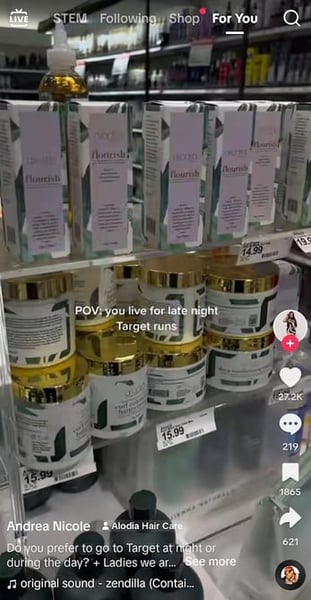
Consistently seeing your products in action (and in-store!) creates a sense of credibility that sets you apart from the TikTok Shop spammers of the beauty world.
Statusphere can activate influencers in your target markets to promote products at select retailers with geotargeting. With our platform, brands instantly activate influencers to promote products to new audiences beyond your current base of creators and brand ambassadors.
Without the legwork of vetting, onboarding and shipping products, you can activate creators faster. That’s how Curlsmith generated 6,500+ pieces of content using our platform.
.png?width=600&height=726&name=curlsmith%20resized%20and%20compressed).png)
We don’t need to convince you that UGC ads are effective.
Beauty brands are going all-in on allowlisting influencer content for a reason. The top-performing TikTok ads in cosmetics and personal care illustrate how unpolished posts are perfect for paid promotions.
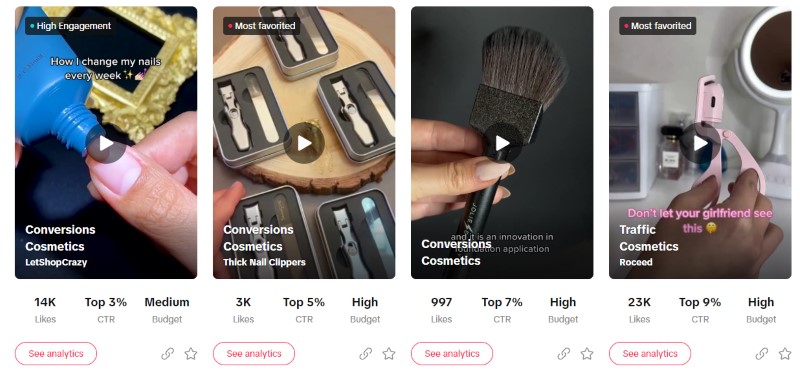
The challenge is sourcing enough UGC to test and optimize your paid performance.
We recently hosted an expert panel on UGC ads. One of the biggest takeaways?
Brands that consistently cycle out UGC for Spark Ads and Partnership Ads see better results and less performance decay. This requires testing dozens of ad creatives at once.
And yeah, that’s a lot of UGC.
For some brands, the challenge isn’t even hitting that volume of content. The issue is all the time spent pitching beauty influencers or negotiating content rights for ads. These tasks can become a full-time job, especially if you’re managing each individual creator.
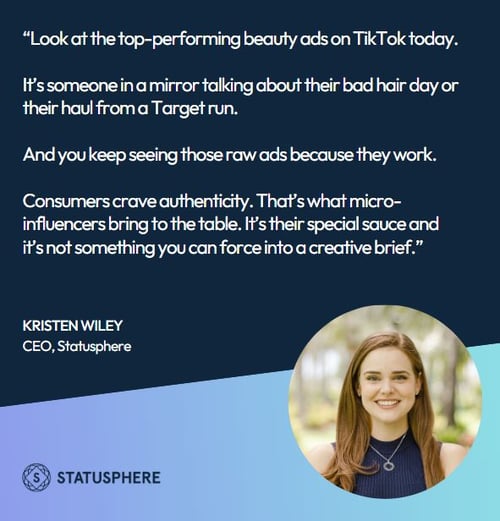
Creating influencer ads shouldn’t feel like constantly working against the clock.
Having worked on both the brand and influencer side of things, we found that there was a lot of time to save in the process of sourcing UGC ads. We built features into Statusphere to automate as much of the process as possible.
For example, usage rights are built into every post generated using our software. Brands can also allowlist content as ads and download posts directly from the platform. The fact that posts and performance data populate in real-time means less waiting.
In fact, more and more brands are using our software to build a foundation of content for UGC ads.
One of our most recent beauty influencer case studies comes from Viori. Using our platform, the brand has already managed to:
You can read more about Viori’s success story here.
.png?width=600&height=651&name=viori%20results%20(resized%20and%20compressed).png)
To say that the cosmetics space is crowded would be the ultimate understatement.
And so the days of hiring one-size-fits-all beauty influencers are over.
Beauty buyers need to see themselves reflected in a creator to trust them. As a result, brands need to be able to target niche beauty influencers versus generalist creators.
Niching down is also big for beauty brands with the rise of social search. Recent data notes that more commercial beauty product searches are happening on TikTok over Google.
For reference, the #Type4Hair tag on TikTok has over 2 billion views alone. Some "niches" aren't as small as you'd think. There's a massive window of opportunity for brands that can tag into relevant searches like this with the right social keywords.
Consider how you can uncover those keywords by targeting influencers based on:
The takeaway? In-depth influencer matchmaking encourages more authentic content. Not to mention unlocking new audiences and cementing your social search presence.
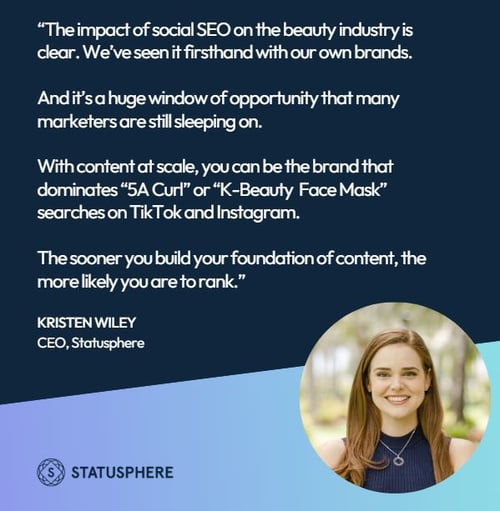
Digging through databases isn’t a time-efficient way to uncover niche creators.
Finding the best beauty influencers for your brand can happen faster through automated targeted based on meaningful data points.
The more data you have to match with those influencers, the better. The thing is, most influencer software doesn't get granular enough when it comes to influencer targeting.
That said, our platform matches brands and creators using 250+ unique, first-party data points. From skin types to preferred cosmetic products, beauty brands use our detailed targeting to match with relevant creators without digging. The process is all on autopilot.
Our approach to influencer matchmaking empowers creators to hit all of the right beats with their content, too. That’s because they fully understand the pain points that resonate with their audience and what to say about any given product.
As noted earlier, so much of influencer marketing for beauty brands involves being able to pivot.
Automated niche targeting coupled with the ability to promote multiple products month-to-month are crucial for beauty brands focused on retention. For example, brands can target cruelty-free creators one month and curly-haired creators the next without halting your current campaigns.
That's the power of true always-on influencer marketing in action!
Expectations are high with so many brands crushing it in the beauty industry right now.
It’s tempting to chase trends and copy competitors. We get it.
But it’s so much more proactive to prioritize reliable, consistent tactics you can scale.
Effective beauty influencer marketing starts with an ongoing, always-on strategy. Building a content engine with influencer software can help you get there faster.
If you need to kickstart that engine and keep it running, Statusphere’s suite of tools can help. Our micro-influencer marketing platform can match your brands with vetted creators from our exclusive network using 250+ first-party data points.
Features like fulfillment, automated reporting and built-in content rights are must-haves for beauty brands that are serious about scaling. We've already generated over 75,000+ posts for 400+ brands. This includes beauty brands like Milani, Undone and Ole Henriksen.
Want to learn more about how our software works? Get in touch with one of our experts to see how we can increase your influencer marketing ROI with a reliable content engine.
This article was first published in December 2023. It was last updated May 25, 2024.

Is Skeepers the right influencer marketing platform for your brand? This post breaks down how Skeepers’ software compares to Statusphere's platform.
Need a platform to send products to creators in exchange for UGC and reviews? We dig into the features of Bazaarvoice and Statusphere to help you...
How does Insense's platform compare to Statusphere? This post breaks down Insense vs. Statusphere including the features and strengths of each...
Be the first to know about the latest tools, trends and strategies in influencer marketing for brands.